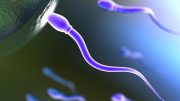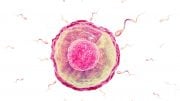
Intermittent fasting is a dietary approach that involves alternating periods of eating and fasting. It does not restrict specific foods, but rather focuses on when to eat them. Some common methods of intermittent fasting include the 16/8 method, where individuals fast for 16 hours and eat during an 8-hour window, and the 5:2 method, where individuals eat normally for 5 days and restrict calorie intake to 500-600 calories for 2 non-consecutive days.
According to a new study from the University of East Anglia, time-restricted fasting diets may lead to fertility issues. The study, published on April 12th, 2023, reveals that time-restricted fasting has differing impacts on reproduction in male and female zebrafish.
Importantly, the study found that some of the negative impacts on egg and sperm quality persist even after the fish resumed their normal eating habits.
The research team says that while the study was conducted in fish, their findings highlight the importance of considering not just the effect of fasting on weight and health, but also on fertility.
Prof Alexei Maklakov, from UEA’s School of Biological Sciences, said: “Time-restricted fasting is an eating pattern where people limit their food consumption to certain hours of the day. It’s a popular health and fitness trend and people are doing it to lose weight and improve their health.
“But the way organisms respond to food shortages can affect the quality of eggs and sperm, and such effects could potentially continue after the end of the fasting period.
“We wanted to find out more about how these sorts of diets can affect fertility in a popular model organism.”
The research team studied zebrafish (Danio rerio) to find out what happens when individuals are exposed to food during and after a period of fasting. They measured how males and females allocate resources to body maintenance versus the production and maintenance of sperm and eggs, and the quality of the resulting offspring.
Dr. Edward Ivimey-Cook, from UEA’s School of Biological Sciences, said: “What we found is that time-restricted fasting affects reproduction differently in males and females. Once the fish returned to their normal feeding schedule, females increased the number of offspring they produced at the cost of egg quality resulting in reduced quality of offspring. The quality of male sperm also decreased.
“These findings underscore the importance of considering not just the effect of fasting on body maintenance but also on the production of eggs and sperm.
“Importantly, some of the negative effects on eggs and sperm quality can be seen after the animals returned to their normal levels of food consumption following time-restricted fasting.
“More research is needed to understand how long it takes for sperm and egg quality to return back to normal after the period of fasting.”
Reference: “Fasting increases investment in soma upon refeeding at the cost of gamete quality in zebrafish” by Edward R. Ivimey-Cook, David S. Murray, Jean-Charles de Coriolis, Nathan Edden, Simone Immler and Alexei A. Maklakov, 12 April 2023, Proceedings of the Royal Society B: Biological Sciences.
DOI: 10.1098/rspb.2022.1556
This study was led by the University of East Anglia in collaboration with researchers at the Centre for Environmental, Fisheries and Aquaculture Science (Cefas).
The study was funded by the European Research Council (ERC), the Biotechnology and Biological Sciences Research Council (BBSRC), and the Natural Environment Research Council (NERC).









“….has differing impacts on reproduction in male and female zebrafish.”
SERIOUSLY?
Sensationalism and such utter misleading bullcrap to compare zebrafish to humans!
It’s pretty standard. Human studies are expensive and have ethics issues. They’ll use zebrafish, or mice, or other analogues to quickly test a hypothesis. If the results in the model animal are negative, a headline like “Intermittent fasting unlikely to cause ___” is appropriate. Otherwise the study shows results that could potentially be replicated in humans. It’s a first step. The headline is factually accurate, that it ‘could’, and humans go unmentioned, and the doctor is right that “More research is needed” which shouldn’t be at the bottom of the article since it’s the main point of doing the fish study.
That said, they did bury ‘zebrafish’ in the lede. I count it as the 119th word, so deep in that it doesn’t show up in the article blurb. People will assume it’s about people, and people aren’t fish. The University of East Anglia intentionally wrote it that way to mislead, and it reminds me they’re the people who said superbugs are spreading due to climate change. Scitechdaily should take care to not publish such misleading headlines & introductions, but it did get us to click.
Fasting is something humans have been doing for millenia. It’s not unethical to study that on humans, that wich humans do.
https://www.nia.nih.gov/news/research-intermittent-fasting-shows-health-benefits
Very true, and people will volunteer for it. I was thinking specifically of drug addiction tests, where they use zebrafish to establish drug preference against morphine to estimate an aspect of addiction potential. They’re handy, because if the experiment kills them, they make good compost, while people are harder to compost. But fasting has been considered a treatment for some diseases, with lots of studies especially recently, and I’ve not seen them mention fertility problems. Probably the opposite actually with ones that found weight loss. It’s possibly a problem, but would need more study. Scitechdaily did an article just this March 26th, “Intensive Religious Fasting Linked to Better School Performance”, which didn’t mention any post-Ramadan sterility.